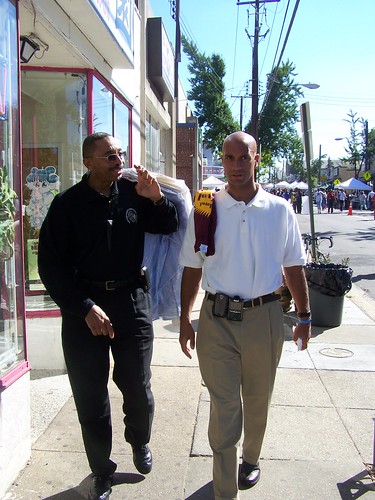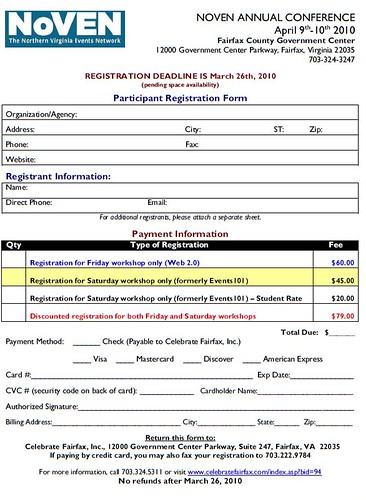Street festivals revisited

Mayor Fenty, Brookland Festival 2007
The City Paper Housing Complex blog reports, in "Parade’s Off: Caribbean Day Short on Cash, Forced to Cancel," that the Caribbean Festival won't be happening this year, because they have $200,000 in debts to the city, which have to be paid before they can get permits.
This isn't a problem unique to DC. It happens in places like Boston and Los Angeles too. Last year, the "famous" Sunset Junction Music Festival in the Silver Lake neighborhood was cancelled for similar reasons, even though Live Nation stepped in to backstop some of the debts. See "Sunset Junction festival cancellation divides fans and merchants" from the Los Angeles Times.
If you have ever organized a street festival etc. (I organized the Brookland Festival in 2007 and was involved in earlier iterations of the H Street Festival, but long before it became wildly successful), you soon learn how much the various city fees are (fees escalate significantly based on the number of attendees), and the reality is that while street festivals were founded usually for three reasons (1) to do community building among residents; (2) for neighborhood/community/commercial development; and (3) fundraising for the sponsoring organization; the reality is that the fees are so high that you are really fundraising mostly to pay the various city fees for street closure, police, emergency services, DCRA inspections, etc. There is little money left over for fundraising definitely.
Were I in the position of being able to reorganize how the DC Government approached neighborhood and community development, I would allocate X amount of monies to support community festivals for each Ward (and then within wards by the neighborhoods), so that as part of the standard process, say the Georgia Avenue Festival would get X amount of financial support in waived fees, if that was one of the festivals that a "participatory budgeting" type exercise determined should get this type of support, by setting Ward community building priorities and financial appropriations.
The Mayor's Office has the discretion to waive fees, but it's a process where you have to know someone, rather than being an open and transparent process. And you have to do it during the fiscal year in which the fees are incurred, which is why it's unlikely that the funds for $200K will be found necessarily, unless some "magic" is done, because you aren't supposed to use current year city funds to pay for expenses from previous years.
Anyway, it's not in City Council's or the Mayor's Office best interest to restructure how "neighborhood" issues are addressed to a more straightforward, nonpolitical way, because the Councilmembers and the Mayor's Office uses "neighborhood services" as more of a way to build ongoing political support amongst stakeholders and citizens, rather than as a way to build community capacity and capability and empowered participation and democracy.
On a side note/1, when he was President of the WDC Economic Partnership, I had an interesting conversation with Steve Moore, and he made the point that the city was looking at street festivals as an expense and fee generator, when actually street festivals (Adams Morgan Day, H Street Festival, Mt. Pleasant Day, etc.) are significant economic development and city promotion devices. He's absolutely right.
In the meantime, events like the Caribbean Festival are really hard to pull off and finance. (Another problem being that technically, you are required to get support signatures from 90% of the affected properties--500 feet (north/south/east/west) of the affected street--and it's a resource sink and impossible to accomplish without people looking the other way.)
And the problems with such fairs in terms of finances--this happened with the Mount Pleasant Festival in something like 2003, because DCRA charged $40,000 for tent construction permits--or permits (I got the permits for the Brookland Festival at 6:30pm on the Friday night before the next day festival, and we all know that DCRA closes at 4:15pm...) is an indicator that something should be done structurally, that policies and practices need to change.
On a side note/2, street festivals need to be curated to be good,and often, even with the big festivals, producers need assistance with improvement and capacity building, and I wrote about that here, "New York City: A New Vision for Street Fairs," in response to the report, A Vision for Street Fairs, published by the Center for an Urban Future.
This weekend happens to be Celebrate Fairfax's (now the Northern Virginia Events Network) conference on how to run big community festivals.

Labels: building a local economy, commercial district revitalization, community building, special events and programming



0 Comments:
Post a Comment
<< Home